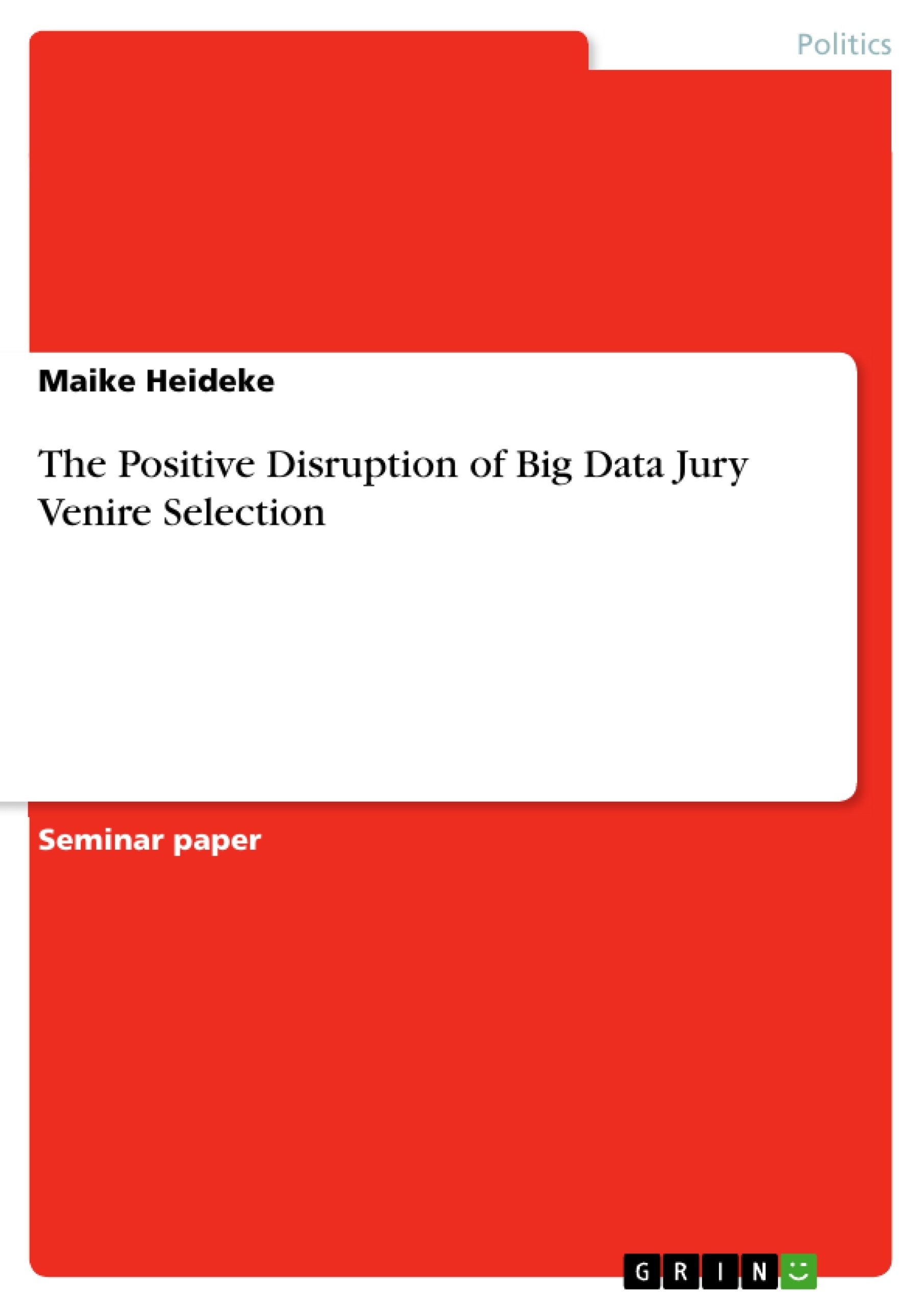This paper looks at an algorithmically- led decision process that is designed to select an (almost) perfectly demographically representative cross-section for a Jury Venire using Big Data.
With the scope of Lepri et al. (2017), this paper identifies that "dark sides" such as privacy violations, informational opacity and discrimination are likely to apply to such a (yet) hypothetical Big Data Jury Venire selection process. Answering the question of how this selection process could be positively disrupted is posed, this paper finds that policies akin to Lepri et al. (2017) would address the majority of the problems identified.
Further research will be required to illuminate further potential dark-sides, define more general, positively disruptive policies, as well as to specify policy suggestions.
Table of Contents
- Introduction
- Key Concepts
- Big Data
- Algorithm
- Positive Disruption
- Big Data Jury Venire Selection
- Context and Outline of Hypothetical Jury Venire Selection Algorithm
- Social Good - The "Bright Side"
- A "Dark Side" Diagnosis of Algorithmic Big Data Jury Venire Selection
- Computational Violations of Privacy
- Information Asymmetry and Lack of Information
- Social Exclusion and Discrimination
- Prescription for Positive Disruption
- Evaluation and Summary
- Conclusion
Objectives and Key Themes
This seminar paper analyzes the potential of Big Data to disrupt the traditional jury selection process. It investigates whether an algorithmically-led approach could create a more representative and fair jury pool while addressing potential "dark sides" such as privacy violations, informational opacity, and discrimination. The paper aims to answer the question of how this selection process could be positively disrupted through the application of policies that mitigate identified risks.
- The potential benefits and challenges of using Big Data in jury selection
- The implications of algorithms and their potential for bias and discrimination
- The importance of privacy, transparency, and fairness in the selection process
- Policies that could positively disrupt the use of Big Data in jury selection
- The ethical and legal considerations surrounding the use of algorithms in the justice system
Chapter Summaries
- Introduction: This chapter introduces the context of algorithmically-led decision processes in various areas, highlighting their potential to cause harm and raising ethical and legal concerns. It then focuses on Big Data Jury Venire selection as a specific case study and presents the research question: How can Big Data Jury Venire Selection be positively disrupted? The chapter concludes by outlining the structure of the paper.
- Key Concepts: This chapter clarifies essential concepts such as Big Data, algorithms, and positive disruption. It examines the different definitions and aspects of Big Data, the characteristics and functions of algorithms, and Lepri et al.'s (2017) approach to positive disruption.
- Big Data Jury Venire Selection: This chapter provides a detailed analysis of the hypothetical Big Data Jury Venire selection algorithm. It discusses the context and outline of the algorithm, its potential benefits for social good, and the identified "dark sides" such as privacy violations, information asymmetry, and discrimination. It also explores the potential for positive disruption and proposes solutions.
Keywords
This paper focuses on the intersection of Big Data, algorithms, and the justice system. It examines the potential of algorithmically-led decision processes to disrupt traditional jury selection practices, exploring both its potential benefits and its "dark sides." Key concepts include privacy, transparency, discrimination, and the need for positive disruption through policy interventions. This paper aims to shed light on the critical ethical and legal implications of utilizing Big Data and algorithms in the context of jury selection, highlighting the need for careful consideration and the development of effective safeguards.
Frequently Asked Questions
Can Big Data improve the jury selection process?
Potentially, yes. An algorithmically-led process could select an almost perfectly demographically representative cross-section of society for a jury venire.
What are the "dark sides" of Big Data in the justice system?
The main risks identified include privacy violations, informational opacity (lack of transparency), and algorithmic discrimination or social exclusion.
What is "Positive Disruption" in this context?
Positive disruption refers to implementing policies and ethical safeguards that mitigate the risks of technology while harnessing its benefits for social good.
How can algorithms lead to discrimination in jury selection?
Algorithms can inherit biases from the data they are trained on, potentially excluding certain social groups from the jury pool based on flawed data patterns.
Is this Big Data jury selection currently in use?
The paper treats this as a "hypothetical" process to analyze the ethical and legal implications before such systems are widely implemented.
- Citar trabajo
- Maike Heideke (Autor), 2019, The Positive Disruption of Big Data Jury Venire Selection, Múnich, GRIN Verlag, https://www.grin.com/document/499629



